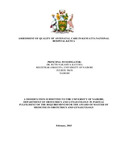| dc.description.abstract | INTRODUCTION: Antenatal care is one of the most fundamental aspects that promise the
success of Millennium Development Goals 4 and 5.However despite improved antenatal care
attendance, parameters like maternal mortality are on the rise in Kenya, which is the reason
for assessment of the quality of antenatal care in Kenyatta National Hospital(KNH). KNH
being the national referral hospital, it‟s a good representation of the quality of care and
nationwide statistics.
OBJECTIVE: To assess the quality of antenatal care in Kenyatta National Hospital (KNH)
STUDY DESIGN: Cross sectional study design.
STUDYSITE: Kenyatta National Hospital, ANC-18
METHODS: 385 respondents who attended at least three antenatal visits to assess the
quality of ANC and underlying factors in a broader view. Data was collected using a
structured questionnaire from both interview of respondents and the respondents‟ records.
Data was computerized using Epi Info and analyzed using SSPS, version 17.
DATACOLLECTION: Data was collected using a structured questionnaire prepared by the
principal investigator. The questionnaire was administered by the principal investigator and
two research assistants, who were registered nurses.
DATA ANALYSIS: Data analysis was conducted using the statistical package for social
sciences version 17.0(SPSS inc, Chicago; il , USA). Using 95% C.I.
RESULTS: Of 385 respondents, the mean age was 29.1 years (SD 5) with a range from 17
to 44 years, with37.7% of respondents aged 25-29 years. Majority (68.3%) of mothers had
had a previous live birth, 28.1% were pregnant for the first time and 3.6% had had an
abortion. Whereas majority (over 94%) of respondents had their height, weight and blood
pressure taken and recorded, 4.7% of respondents had no heightmeasurement,1.04% had no
weight measurementand1.04% had no blood pressure measurement and recording by third
antenatal visit. Although majority 97.9% of respondents had a recorded obstetric
examination, only 28.6% of respondents had a recorded general physical examination.
7.8%,19.5%,28.6%,6.2% and5.2% had no record of haemoglobin, blood group, syphilis, HIV
and Urinalysis respectively ever been taken by the third ANC visit. Among the respondents
informed of the results, only 16.9% and 34.8% understood the haemoglobin and Urinalysis
results. Majority could however understand HIV 83.4% and syphilis 64.9% tests. The
average time spent in the antenatal clinic was 3hrs 29 minutes, with a range from 1 hour 5
minutes to 5 hours 30 minutes, majority 135(35.1%) of respondents spent >3-4 hours. The
respondents rated ANC services at KNH as 25.1% very good, 37.3%good, 30% fair and
7.6% as poor. Among other limitations to the suggested interventions were luck of funds to
purchase drugs, out of stock for vaccines and reagents in the laboratory.
CONCLUSION: The study showed that the quality of antenatal care in KNH is above
average although there are gaps in the passage of information, failure to document findings
and basic investigations have not been done for some clients. This can hamper the timely
intervention. | en_US |
| dc.description.department | a
Department of Psychiatry, University of Nairobi, ; bDepartment of Mental Health, School of Medicine,
Moi University, Eldoret, Kenya | |

